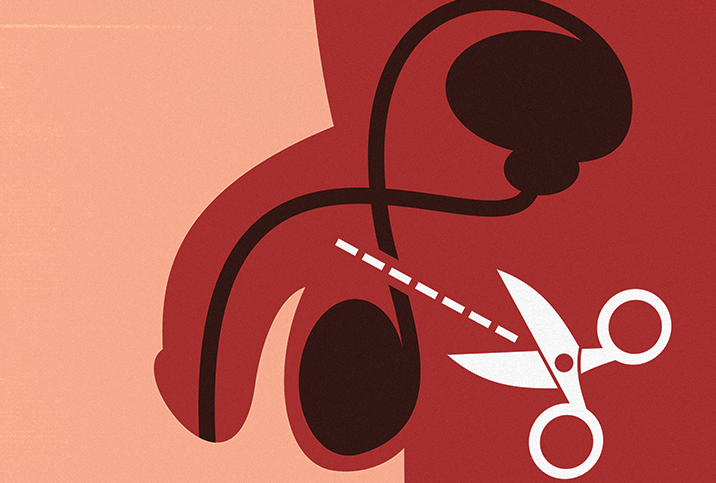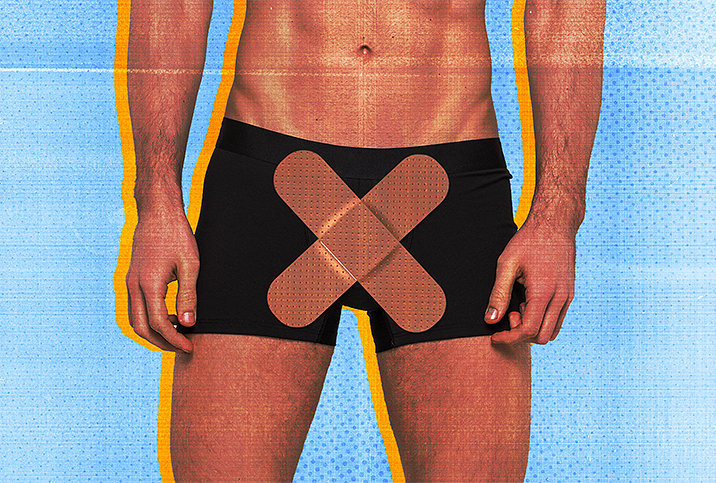Please Stop Believing These Vasectomy/ED Inaccuracies

A vasectomy might stir different emotions in different people. For some, it might mark the beginning of a different kind of sex life, free from the possibility of pregnancy. For others, it might mark the end of a stage of life, when their family is complete.
No matter the emotions associated with a vasectomy, there will inevitably be some misconceptions, too. Despite the fact that a vasectomy is a commonly performed procedure—about 500,000 men elect to have it done every year in the United States—it's not necessarily a subject widely discussed in male circles.
"Men have all kinds of beliefs about vasectomy," said Joshua Gonzalez, M.D., a board-certified urologist and sexual health advisor with Astroglide, a California-based manufacturer of personal lubricants. "Many think that a vasectomy will be a painful experience. Others think it will cause issues with their sex drive or erections or generally negatively affect their sex life."
Fortunately, none of those beliefs is true, and the myth that vasectomies are linked to any type of erectile dysfunction particularly needs to be debunked. Check out five common inaccuracies, and by the end, we hope you understand why it's downright impossible for a vasectomy to lead to erectile dysfunction (ED).
Inaccuracy #1
'The snip' will affect my sexual organ.
Hear this, men: The anatomy doesn't line up. It's critical to understand that it's just not possible for a vasectomy to lead to erectile dysfunction because the anatomy behind the two are virtually worlds apart.
Adam Ramin, M.D., a urologist and the medical director of Urology Cancer Specialists in Los Angeles, explained that he performs a lot of vasectomies and the most common question he hears from patients is will they develop sexual problems because of the procedure. He understands their concern.
"They know that it's an operation involving their sexual organs, so it's natural to worry if something that is done to one part of your sexual organ, that may translate to problems with sexuality," Ramin said.
Fortunately, however, Ramin explained there is no need to worry, because the nerves and blood vessels that help control erections are nowhere near the vas deferens, the tube that is cut during a vasectomy. These nerves and blood vessels run deep inside the pelvis and into the penis. But when a vasectomy is performed, the doctor cuts only inside the scrotum, which is well away from both the penis and the pelvis.
The bottom line?
"There is no physical chance of erectile dysfunction problems with a vasectomy," he said.
Inaccuracy #2
A vasectomy will affect my physical sexual experience.
Okay, so a vasectomy can't cause erectile dysfunction, but what about the other physical aspects of sex? Will it change those? The answer: Yes, but it shouldn't have any bearing on erections, experience or sensation, Ramin said.
He explained the only major difference some men will notice is in the quantity and quality of ejaculate. When they orgasm and ejaculate, the semen will look different—clearer and less white or pearly looking in color—and be about 20 percent less voluminous than it was before the vasectomy.
"This is because there is no sperm coming through," Ramin added. "Therefore, the fluid will contain prostate fluid and seminal vesicle fluid, but no sperm."
'There is no physical chance of erectile dysfunction problems with a vasectomy.'
While the overall physical impact of a vasectomy on your sex life should be practically nothing, Ramin did caution that there is a very small chance of chronic testicular pain after the procedure. In this case, the pain could impact your sex life, because it could be painful to be touched or even orgasm.
Chronic testicular pain occurs in only 1 percent to 2 percent of men who get a vasectomy. But if you have a history of trauma to the testicles, testicular infections or hydroceles, your risk could increase, so be sure to talk to your doctor about potential outcomes.
Inaccuracy #3
A vasectomy has only physical consequences.
Although it's not physically possible for a vasectomy to cause erectile dysfunction, Ramin explained it is theoretically possible for a vasectomy patient to experience some type of psychologically driven ED.
Unlike erectile dysfunction caused by physical factors, such as diabetes or high blood pressure, psychological, or psychogenic, erectile dysfunction is caused by mental factors, such as anxiety or depression.
"Erectile dysfunction can be psychologically driven or physical—it's not always because there's something physically wrong," Ramin explained.
Gonzalez said he has seen a few cases of erectile dysfunction following vasectomy that were linked to pelvic muscle tension, which occurred in response to the procedure. However, this type of muscle tension is not related to the mechanics of the vasectomy and can be addressed with muscle therapy.
If you do experience any type of erectile dysfunction following a vasectomy, Ramin encouraged a visit to the doctor to discuss symptoms and treatment options. For instance, underlying causes such as depression or anxiety can be addressed and medication such as Viagra can be prescribed to help.
Inaccuracy #4
The cause of my ED has to be the cut, not my age.
The biggest risk factor for erectile dysfunction is not anything related to a vasectomy—instead, it's simply getting older.
The risk for erectile dysfunction increases with age, especially after 40, according to the International Journal of Clinical Practice. It's estimated that as many as 40 percent of men experience some form of erectile dysfunction by age 40, and the percentage jumps to nearly 70 percent by age 70.
All that to say, if anyone has tried to scare you with stories of developing ED after a vasectomy, it may very well be their age that caused erection problems, not the snip.
"The few cases I have seen of erectile dysfunction following a vasectomy are typically related to abnormal erectile function prior to the procedure," Gonzalez said. "The big takeaway here is that vasectomy itself does not cause it."
For this reason, both Gonzalez and Ramin stressed how important it is for older men to be assessed for erectile dysfunction before a vasectomy. If you are experiencing symptoms of ED or have concerns at any age, be sure to talk to a urologist before getting the snip.
Inaccuracy #5
My sex life will never be as good as it was before the snip.
For some men, a vasectomy could have a positive effect on their sex life. Without the worry of undesired pregnancy, the man and his partner could enjoy intimacy together in a different way.
"There is a positive effect in the sense that if the man is not worried about impregnating his significant other, they can partake in sexual activity more and be more confident, so it may elevate the enjoyment of having sex," Ramin noted.
In the end, Ramin explained, a vasectomy is a neutral procedure, with neither a negative nor a positive physical sexual effect.
However, he added that it's important to have a frank discussion with your doctor about your reasons for getting a vasectomy and your medical conditions, as well as to ensure you understand exactly what follows the procedure.
"It's important to understand all the aspects so there are no regrets afterward," Ramin said.




















